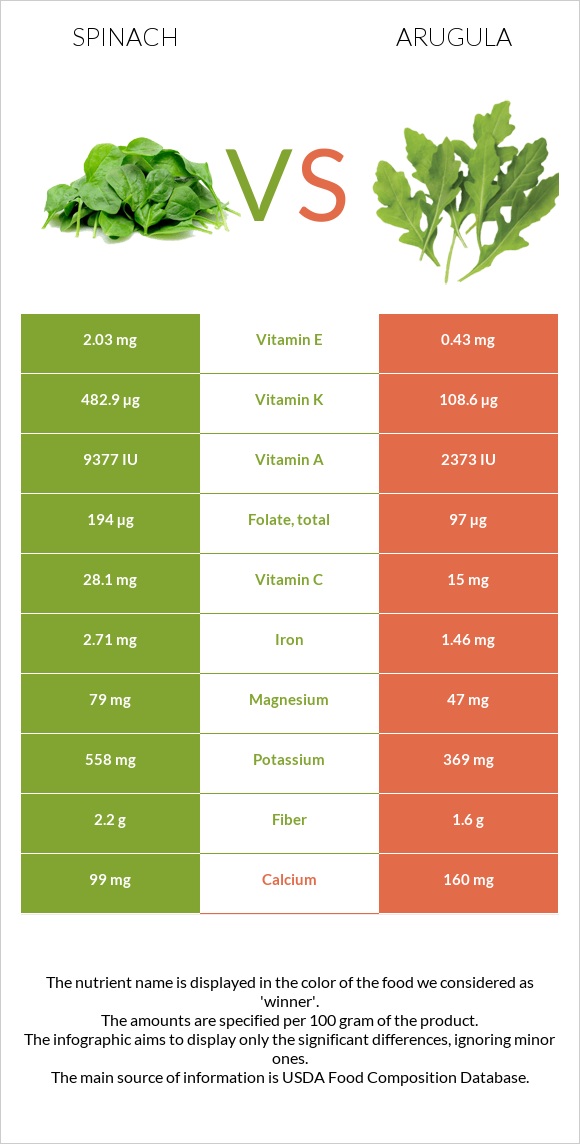Spinach vs. Arugula — In-Depth Nutrition Comparison
Compare
What are the differences between spinach and arugula?
- The amount of vitamin K, vitamin A, manganese, iron, vitamin B6, folate, vitamin B2, vitamin E, copper, and magnesium in spinach is higher than in arugula.
- Spinach's daily need coverage for vitamin K is 321% more.
- Arugula contains 5 times less vitamin E than spinach. Spinach contains 2.08mg of vitamin E, while arugula contains 0.43mg.
We used Spinach, cooked, boiled, drained, without salt and Arugula, raw types in this article.
Infographic

Infographic link
Mineral Comparison
Mineral comparison score is based on the number of minerals by which one or the other food is richer. The "coverage" charts below show how much of the daily needs can be covered by 300 grams of the food.
| Contains more MagnesiumMagnesium | +85.1% |
| Contains more PotassiumPotassium | +26.3% |
| Contains more IronIron | +144.5% |
| Contains more CopperCopper | +128.9% |
| Contains more ZincZinc | +61.7% |
| Contains more ManganeseManganese | +191.3% |
| Contains more SeleniumSelenium | +400% |
| Contains more CalciumCalcium | +17.6% |
| Contains less SodiumSodium | -61.4% |
Vitamin Comparison
Vitamin comparison score is based on the number of vitamins by which one or the other food is richer. The "coverage" charts below show how much of the daily needs can be covered by 300 grams of the food.
| Contains more Vitamin AVitamin A | +340.3% |
| Contains more Vitamin EVitamin E | +383.7% |
| Contains more Vitamin B1Vitamin B1 | +115.9% |
| Contains more Vitamin B2Vitamin B2 | +174.4% |
| Contains more Vitamin B3Vitamin B3 | +60.7% |
| Contains more Vitamin B6Vitamin B6 | +231.5% |
| Contains more Vitamin KVitamin K | +354.5% |
| Contains more FolateFolate | +50.5% |
| Contains more Vitamin CVitamin C | +53.1% |
| Contains more Vitamin B5Vitamin B5 | +201.4% |
All nutrients comparison - raw data values
| Nutrient |  |
 |
DV% diff. |
| Vitamin K | 493.6µg | 108.6µg | 321% |
| Vitamin A | 524µg | 119µg | 45% |
| Manganese | 0.935mg | 0.321mg | 27% |
| Iron | 3.57mg | 1.46mg | 26% |
| Vitamin B6 | 0.242mg | 0.073mg | 13% |
| Vitamin B2 | 0.236mg | 0.086mg | 12% |
| Folate | 146µg | 97µg | 12% |
| Copper | 0.174mg | 0.076mg | 11% |
| Vitamin E | 2.08mg | 0.43mg | 11% |
| Magnesium | 87mg | 47mg | 10% |
| Vitamin C | 9.8mg | 15mg | 6% |
| Vitamin B5 | 0.145mg | 0.437mg | 6% |
| Vitamin B1 | 0.095mg | 0.044mg | 4% |
| Potassium | 466mg | 369mg | 3% |
| Fiber | 2.4g | 1.6g | 3% |
| Zinc | 0.76mg | 0.47mg | 3% |
| Calcium | 136mg | 160mg | 2% |
| Sodium | 70mg | 27mg | 2% |
| Selenium | 1.5µg | 0.3µg | 2% |
| Protein | 2.97g | 2.58g | 1% |
| Fats | 0.26g | 0.66g | 1% |
| Phosphorus | 56mg | 52mg | 1% |
| Vitamin B3 | 0.49mg | 0.305mg | 1% |
| Choline | 19.7mg | 15.3mg | 1% |
| Polyunsaturated fat | 0.109g | 0.319g | 1% |
| Calories | 23kcal | 25kcal | 0% |
| Net carbs | 1.35g | 2.05g | N/A |
| Carbs | 3.75g | 3.65g | 0% |
| Sugar | 0.43g | 2.05g | N/A |
| Saturated fat | 0.043g | 0.086g | 0% |
| Monounsaturated fat | 0.006g | 0.049g | 0% |
| Tryptophan | 0.04mg | 0% | |
| Threonine | 0.127mg | 0% | |
| Isoleucine | 0.152mg | 0% | |
| Leucine | 0.231mg | 0% | |
| Lysine | 0.182mg | 0% | |
| Methionine | 0.055mg | 0% | |
| Phenylalanine | 0.134mg | 0% | |
| Valine | 0.168mg | 0% | |
| Histidine | 0.066mg | 0% |
Macronutrient Comparison
Macronutrient breakdown side-by-side comparison
| Contains more ProteinProtein | +15.1% |
| Contains more OtherOther | +29.3% |
| Contains more FatsFats | +153.8% |
~equal in
Carbs
~3.65g
~equal in
Water
~91.71g
Fat Type Comparison
Fat type breakdown side-by-side comparison
| Contains less Sat. FatSaturated fat | -50% |
| Contains more Mono. FatMonounsaturated fat | +716.7% |
| Contains more Poly. FatPolyunsaturated fat | +192.7% |




